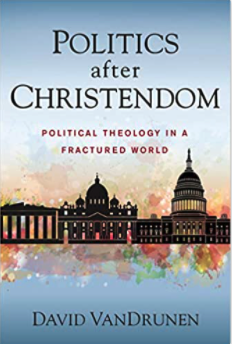Politics After Christendom
The timeliness of VanDrunen’s book, Politics After Christendom, is nearly unmistakable given the historical level of political contention seen, heard or otherwise recently experienced in our country. However, in striking contrast to our nation’s emotionally-charged political environment, VanDrunen provides a decidedly unemotional, clinical, and compelling biblical argument for how the Christian can function in this post-Christendom world, where government and church are separate.

A world where the Christian rightly sees her or himself, as the Apostle Peter reminds us, as a sojourner and an exile (cf. 1 Pet. 2:11). It’s incredibly important to note, this book isn’t about helping the church better function in this world; rather, it’s about helping the Christian better function as a dual citizen, honoring Christ and loving our neighbor.
VanDrunen makes use of a two kingdoms philosophy, where God rules all things, but in a twofold way through both the common kingdom and the redemptive kingdom. The Christian is part of both kingdoms (by the grace of God in Christ); hence we can speak of ourselves as dual citizens.
Another concept VanDrunen uses for his book is Augustine’s two cities, where “Christians are citizens of the city of God, the heavenly new creation, while unbelievers are citizens of another city, doomed to destruction” (pg. 20). The third standard VanDrunen uses is natural law, through which all human beings know their moral responsibilities before God.
Two kingdoms, two cities, and natural law all figure into the equation of VanDrunen’s book. These three paradigms are not new, but what is unique is VanDrunen using and explaining these three concepts in the context of biblical covenants.
He credibly advances the notion of the Noahic covenant as a lynchpin to understanding the necessary differences between both God and man as well as believer and unbeliever. He makes a straightforward case that the Noahic covenant (Genesis 8:21-9:16), is a universal covenant, which applies to all mankind.
The Noahic covenant not only is the origin for all political systems, but also the basis for making those very same political systems and governments accountable to God.
Furthermore, he characterizes the Noahic covenant as common, as compared to the new covenant, which is holy. The Noahic covenant applies to all of mankind and is designed, in part, to preserve humanity, and to permit subsequent covenants to come into play, including the new covenant, which only applies to believers.
Unlike the new covenant, which is eternal for believers, the Noahic covenant is temporary and will be terminated upon the return of Christ. Until that day, understanding the divine and earthly differences between the Noahic and new covenants is incredibly helpful to know how best to properly navigate the two kingdoms, two cities, and natural law world in which we live.
VanDrunen’s book provides the reader plausible categories that enable the Christian to be actively engaged in this world but not caught up in the things of this world. It provides the ethos for how a believer can remain focused on Christ while loving our neighbor, no matter our neighbor’s political affiliation, social agenda, or cultural differences.
VanDrunen indicates his goal for the book is helping Christians in “living just and fruitful lives that bless our neighbors …, as we ‘serve the living and true God and wait for his Son from heaven’ (1 Thess. 1:9-10).” Congratulations Mr. VanDrunen, mission accomplished.
More in Monthly Newsletter
May 1, 2024
The Christian Ethic of Joy and SufferingMay 1, 2024
Elders ReportMay 1, 2024
Deacons Report